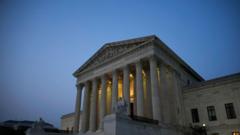The US Supreme Court convened on Thursday to deliberate President Donald Trump's contentious order to end birthright citizenship, a move that poses crucial questions for immigration law and the foundational principles enshrined in the Constitution. The case brought forth challenges to the power of lower courts to block presidential actions nationwide, with implications that could reshape the executive branch's authority.
The discussion saw a diverse range of opinions, with the US solicitor general contending that judicial interventions by lower courts have been excessive, arguing that such power needs to be constrained. In contrast, New Jersey's solicitor general, representing various states, cautioned that Trump's approach could lead to a fragmented citizenship system, potentially creating a scenario where citizenship rights vary by state, leading to "chaos on the ground."
As the justices engaged in this deliberative process, they focused on two critical issues: whether judges at lower levels should have the latitude to hinder presidential initiatives across the nation and whether Trump's proposed order aligns with existing constitutional guarantees. Critics assert that the order contravenes the 14th Amendment, which affirms citizenship rights for anyone born in the United States.
Solicitor General D John Sauer positioned the administration's argument around the purported chaos of the current judicial landscape, suggesting class-action lawsuits as an alternative to wide-reaching injunctions. This recommendation was met with skepticism, highlighting the potential difficulties in timely legal remedies during urgent situations.
Justice Elena Kagan probed the legitimacy of Trump's case by pointing out the administration's struggles in lower courts. Meanwhile, conservative Justice Samuel Alito expressed concerns regarding the blanket authority granted to lower court judges, questioning their judicial impartiality.
The conversation also included passionate responses from attorneys representing states contesting the executive move, who asserted that eliminating nationwide injunctions could create substantial disparities in citizenship status. They argued that since the protections of the 14th Amendment have historically not varied by state, accepting Trump's position would disrupt established norms.
Outside the courthouse, demonstrators expressed their opposition to Trump’s immigration policies, with former House Speaker Nancy Pelosi participating in the protests, emphasizing the importance of due process and fundamental citizenship rights.
The Supreme Court Ruling, which could potentially reshape the scope of presidential authority regarding immigration issues, remains uncertain. With three justices appointed by Trump, the composition of the court adds a layer of complexity to the decision. Legal experts caution that a ruling in favor of Trump may still trigger subsequent legal challenges, reinforcing that the constitutional guarantees tied to birthright citizenship are not easily dismissed.
As the justices weigh the arguments, they recognize the heavy implications of their ruling, asserting that a modification to birthright citizenship could affect tens of thousands of individuals in the United States, including the prospect of generating a populace with ambiguous citizenship status. Critics of the Trump administration’s approach raise alarms about the generational impact of dismantling the existing legal framework and the potential for creating many stateless individuals.



















